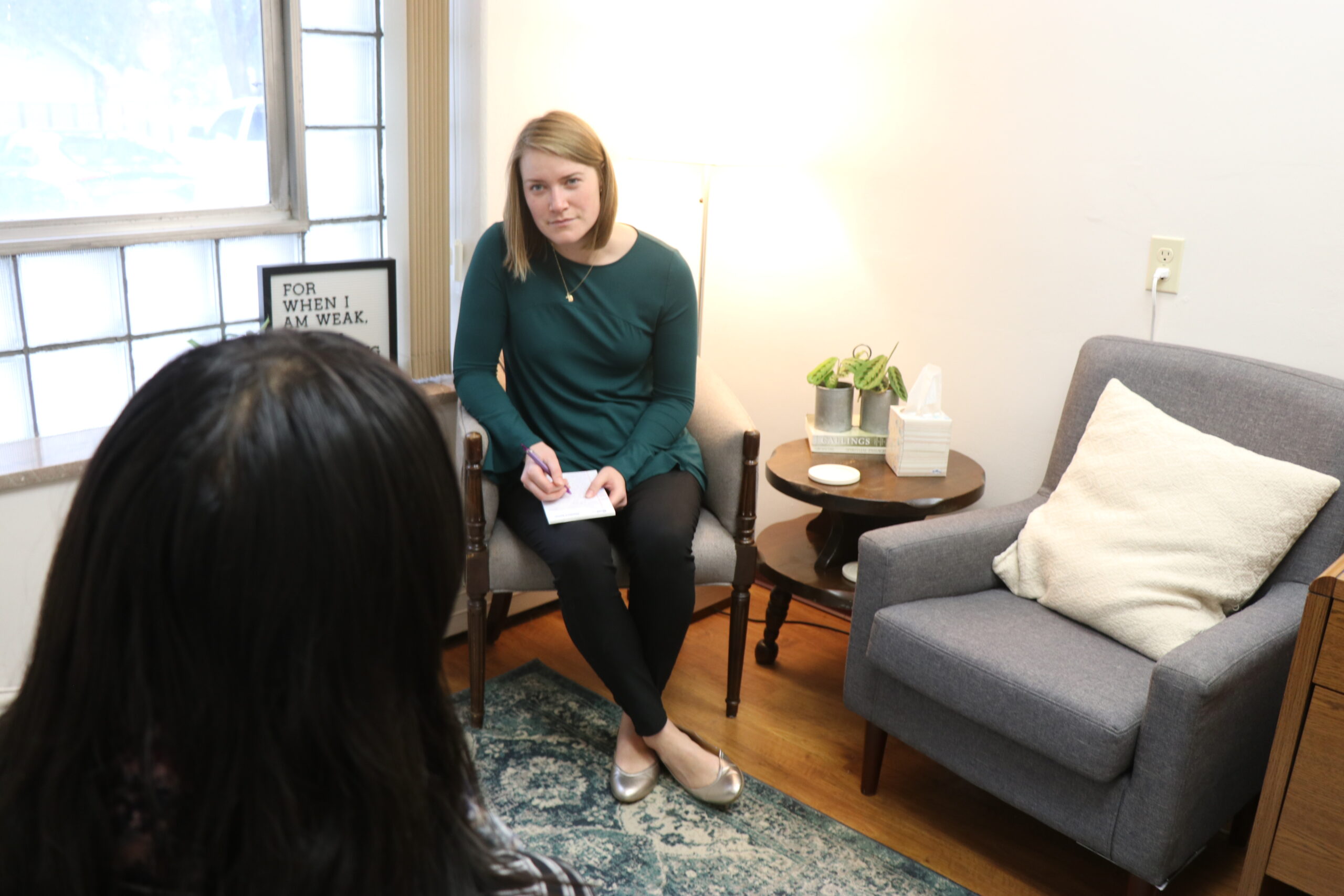
Catholic Charities Therapist Bria Halama at the organization’s Waukesha office. (Photo courtesy of Catholic Charities)
Laura Ramos remembers well the challenge of trying to help a distraught client attempting to leave a domestic violence situation. The woman had mental health issues, but those needed to be addressed after she found safe housing away from her abuser.
“She had no money for housing and, during the pandemic, it was an extra stressor. She didn’t have work because she recently lost her job,” Ramos said. “It was hard to find resources, as she has a family. So we reached out to our community to find help for her so we could address her mental health issues.”
Since the pandemic, the need for mental health treatment has increased due to financial challenges, drug use and better mental health awareness, said Ramos, who added they need funding for more therapists, especially those who can speak Spanish.
Ramos is the director of community counseling for the Archdiocese of Milwaukee’s Catholic Charities. Counseling is one of the many services provided by Catholic Charities and directly funded through the annual Catholic Stewardship Appeal.
According to Jackie Rekowski, director of mission advancement for Catholic Charities, each of the therapists has a caseload of approximately 30 clients per month, which includes families. She said they are at capacity and have a need greater than the number of therapists. They rely on the generous donations to the Catholic Stewardship Appeal for help.
“From the CSA, Catholic Charities receives 20 percent of their support through an annual grant, which benefits our counseling services,” said Rekowski. “We do require additional funding from private donors and foundations due to the overall scope of our work.”
Currently in the archdiocese, there are 14 full-time therapists and four student interns serving Community Counseling Services. There are offices in Milwaukee, Sheboygan, Fond du Lac, Waukesha, Racine, Kenosha and Elkhorn. During the pandemic, it was determined that Washington County also needed services, so offices opened in West Bend and Hartford.
“We have bilingual therapists at all our offices and have case managers there, too. Every office has someone who speaks Spanish and shares case management with our counseling services,” Ramos said. “This way, we can help individuals, and families with basic needs — such as employment and housing — will be assisted by a housing case manager. This person will work with the individual to shore up basic needs so our counseling services can deal with the mental health needs.”
Clients can be supported through an outpatient clinical setting, where licensed therapists and interns provide individual, couple and family support. In some instances, support groups for individuals dealing with certain issues, such as grief, are available.
“This outpatient program is licensed in Wisconsin. We provide counseling services to those who may or may not have insurance,” Ramos said. “We accept most insurance plans and are unique: we can waive the cost of counseling sessions if the person does not have insurance or if their co-pays and deductibles are too high.”
Community Counseling Services works with children ages 6 and older. Ramos explained that therapists like to incorporate the entire family, as they believe that much of what parents are experiencing is transferred over to the children.
“To qualify for counseling services the intake process is really simple,” Ramos said. “We have streamlined the process where, when a person calls any of our locations, they just need to provide very basic demographic information, such as name, address, phone number and type of counseling needed and that is about it. If they have no insurance, that is not a problem, and we make sure to get a client with a therapist within two weeks.”
If the person calling expresses thoughts of suicide, the situation is addressed immediately; they assess the person and complete a safety plan, Ramos said.
“If a client needs a higher level of care, we refer them to an appropriate clinic, where they can get inpatient care and referrals for treatment,” Ramos said. “At times, hospitals will work with clients on the fees if they don’t have insurance. For example, Aurora has a Helping Hands program, and other hospitals will also work with clients who are facing financial issues.”
While hospital stays for those expressing thoughts of suicide are necessary, they are designed for short-term care to stabilize the client and help keep them from immediate danger. For long-term recovery, Catholic Charities’ Counseling Services are available to help.
For those interested in serving Catholic Charities as a therapist, visit the careers section on the Catholic Charities website at https://www.ccmke.org/Catholic-Charities.htm.
